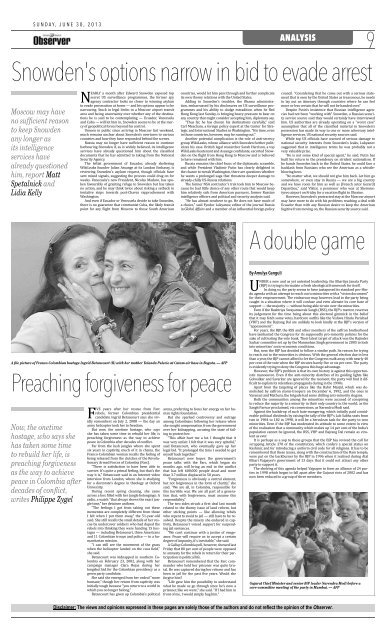OmanObserver_30-06-13
OmanObserver_30-06-13
OmanObserver_30-06-13
Create successful ePaper yourself
Turn your PDF publications into a flip-book with our unique Google optimized e-Paper software.
SUNDAY, JUNE <strong>30</strong>, 20<strong>13</strong><br />
Snowden's options narrow in bid to evade arrest<br />
Moscow may have<br />
no suficient reason<br />
to keep Snowden<br />
any longer as<br />
its intelligence<br />
services have<br />
already questioned<br />
him, report Matt<br />
Spetalnick and<br />
Lidia Kelly<br />
NEARLY a month after Edward Snowden exposed top<br />
secret US surveillance programmes, the former spy<br />
agency contractor looks no closer to winning asylum<br />
to evade prosecution at home — and his options appear to be<br />
narrowing. Stuck in legal limbo in a Moscow airport transit<br />
area and facing uncertainty over whether any of the destinations<br />
he is said to be contemplating — Ecuador, Venezuela<br />
and Cuba — will let him in, Snowden seems to be at the mercy<br />
of geopolitical forces beyond his control.<br />
Unseen in public since arriving in Moscow last weekend,<br />
much remains unclear about Snowden's overtures to various<br />
countries and how they have responded behind the scenes.<br />
Russia may no longer have suficient reason to continue<br />
harbouring Snowden if, as is widely believed, its intelligence<br />
services have already questioned him about the classiied<br />
documents that he has admitted to taking from the National<br />
Security Agency.<br />
The leftist government of Ecuador, already sheltering<br />
WikiLeaks founder Julian Assange at its London Embassy, is<br />
reviewing Snowden's asylum request, though oficials have<br />
sent mixed signals, suggesting the process could drag on for<br />
weeks. Venezuela's new President, Nicolas Maduro, has spoken<br />
favourably of granting refuge to Snowden but has taken<br />
no action, and he may think twice about risking a setback in<br />
tentative steps towards post-Chavez rapprochement with<br />
Washington.<br />
And even if Ecuador or Venezuela decide to take Snowden,<br />
there is no guarantee that communist Cuba, the likely transit<br />
point for any light from Moscow to those South American<br />
A ile picture of Franco-Colombian hostage Ingrid Betancourt (R) with her mother Yolanda Pulecio at Catam air base in Bogota. — AFP<br />
FIVE years after her rescue from Farc<br />
rebels, former Colombian presidential<br />
candidate Ingrid Betancourt says she vividly<br />
remembers on July 2, 2008 — the day an<br />
army helicopter took her to freedom.<br />
But now, the onetime hostage, who says<br />
she has taken some time to rebuild her life, is<br />
preaching forgiveness as the way to achieve<br />
peace in Colombia after decades of conlict.<br />
Far from the lush jungles where she spent<br />
six years in captivity, much of it in chains, the<br />
Franco-Colombian woman recalls the feeling of<br />
being released from the clutches of the Revolutionary<br />
Armed Forces of Colombia (Farc).<br />
"There is satisfaction to have been able to<br />
survive. It's quite a primal feeling, but that's the<br />
way it is," Betancourt said in an Internet video<br />
interview from London, where she is studying<br />
for a doctorate's degree in theology at Oxford<br />
University.<br />
During recent spring cleaning, she came<br />
across a box illed with her jungle belongings: A<br />
radio, a watch "that always shows the exact jungle<br />
time," her detainee uniform.<br />
"The feelings I got from taking out these<br />
mementos are completely different from those<br />
I felt when I put them away," the 51-year-old<br />
said. She still recalls the small details of her rescue<br />
by undercover soldiers who had duped the<br />
rebels into thinking they were handing 15 hostages<br />
— including Betancourt, three Americans<br />
and 11 Colombian troops and police — to a humanitarian<br />
mission.<br />
"I can still see the movement of the grass<br />
when the helicopter landed on the coca ield,"<br />
she said.<br />
Betancourt was kidnapped in southern Colombia<br />
on February 23, 2002, along with her<br />
campaign manager Clara Rojas during her<br />
longshot bid for the Colombian presidency as a<br />
green party candidate.<br />
She said she emerged from her ordeal "more<br />
humane," though her return from captivity was<br />
initially tough because "you return to a world in<br />
which you no longer belong."<br />
Betancourt has given up Colombia's political<br />
countries, would let him pass through and further complicate<br />
its own thorny relations with the United States.<br />
Adding to Snowden's troubles, the Obama administration,<br />
embarrassed by his disclosures on US surveillance programmes<br />
and his ability to dodge extradition when he led<br />
Hong Kong last Sunday, is bringing heavy pressure to bear on<br />
any country that might consider accepting him, diplomats say.<br />
"Thus far, he has chosen his destinations carefully," said<br />
Carl Meacham, a foreign policy expert at the Center for Strategic<br />
and International Studies in Washington. "His time, even<br />
in those countries, however, may be running out."<br />
Another potential complication is the role of anti-secrecy<br />
group WikiLeaks, whose alliance with Snowden further politicizes<br />
his case. British legal researcher Sarah Harrison, a top<br />
WikiLeaks lieutenant and Assange conidante, escorted Snowden<br />
on the light from Hong Kong to Moscow and is believed<br />
to have remained with him.<br />
Russia remains the chief focus of the diplomatic scramble,<br />
and while President Vladimir Putin has clearly delighted in<br />
the chance to tweak Washington, there are questions whether<br />
he wants a prolonged saga that threatens deeper damage to<br />
already-chilly US-Russia relations.<br />
The former NSA contractor's trek took him to Moscow because<br />
he had little choice of any other route that would keep<br />
him relatively safe from American pursuers, former Russian<br />
intelligence oficers and political and security analysts said.<br />
"He has almost nowhere to go. He does not have much of<br />
a choice," said Fyodor Lukyanov, editor of the journal Russia<br />
in Global Affairs and a member of an inluential foreign policy<br />
Preaching forgiveness for peace<br />
Now, the onetime<br />
hostage, who says she<br />
has taken some time<br />
to rebuild her life, is<br />
preaching forgiveness<br />
as the way to achieve<br />
peace in Colombia after<br />
decades of conlict,<br />
writes Philippe Zygel<br />
arena, preferring to focus her energy on her human<br />
rights foundation.<br />
But she sparked controversy and outrage<br />
among Colombians following her release when<br />
she sought compensation from the government<br />
over her kidnapping, accusing the state of failing<br />
to protect her.<br />
"This affair hurt me a lot. I thought that it<br />
was very unfair. I felt that it was very spiteful,"<br />
said Betancourt, who eventually gave up her<br />
legal bid. "It prolonged the time I needed to get<br />
myself back together."<br />
Betancourt now hopes the government's<br />
peace talks with the Farc, which began six<br />
months ago, will bring an end to the conlict<br />
that has left 600,000 people dead and more<br />
than 3.7 million displaced in 50 years.<br />
"Forgiveness is obviously a central element,<br />
but not forgiveness in the form of charity," she<br />
said. "We are all, in Colombia, responsible for<br />
this horrible war. We are all part of a generation<br />
that, with forgiveness, must assume this<br />
responsibility."<br />
The two sides struck a irst deal last month<br />
related to the thorny issue of land reform, but<br />
other sticking points — like allowing rebels<br />
who repent to avoid to jail — still have to be resolved.<br />
Despite the misery she endured in captivity,<br />
Betancourt voiced support for suspending<br />
jail sentences.<br />
"We can't continue with a justice of vengeance.<br />
Peace will require us to accept a certain<br />
degree of impunity, it's inevitable," she said.<br />
A Gallup Colombia poll, however, showed last<br />
Friday that 80 per cent of people were opposed<br />
to amnesty for the rebels in return for their participation<br />
in political life.<br />
Betancourt remembered that the Farc commander<br />
who held her prisoner was quite brutal.<br />
He was captured during her release and has<br />
been in jail for the past ive years. Would she<br />
forgive him?<br />
"Life gave him the possibility to understand<br />
what he made us go through since he's now a<br />
prisoner, like we were," she said. "If I had him in<br />
front of me, I would simply hug him."<br />
council. "Considering that he came out with a serious statement<br />
that is seen by the United States as treasonous, he needs<br />
to lay out an itinerary through countries where he can feel<br />
more or less certain that he will not be handed over."<br />
Despite Putin's insistence that Russian intelligence agencies<br />
had not been "working with" Snowden, a Russian security<br />
service source said they would certainly have interviewed<br />
him. US authorities are already operating on a "worst case"<br />
assumption that all of the classiied material in Snowden's<br />
possession has made its way to one or more adversary intelligence<br />
services, US national security sources said.<br />
While top US oficials have warned of serious damage to<br />
national security interests from Snowden's leaks, Lukyanov<br />
suggested that in intelligence terms he was probably not a<br />
very valuable prize.<br />
"He is not some kind of special agent," he said. Putin has<br />
built his return to the presidency on strident nationalism. If<br />
he hands Snowden back to the United States, he could face a<br />
backlash from Russians who see the American as a whistleblowing<br />
hero.<br />
"No matter what, we should not give him back. Let him go<br />
somewhere, or even stay in Russia — we are a big country<br />
and we have room for him as well as (French actor Gerard)<br />
Depardieu," said Viktor, a pensioner who was at Sheremetyevo<br />
airport on Friday for a vacation light to Ukraine.<br />
However, Snowden's protracted stay at the Moscow airport<br />
may have more to do with his problems reaching a deal with<br />
Ecuador than with any Russian desire to keep the American<br />
fugitive from moving on, the Russian security source said.<br />
A double game<br />
By Amulya Ganguli<br />
ANALYSIS<br />
UNDER a new and as yet untested leadership, the Bhartiya Janata Party<br />
(BJP) is trying to formulate a fresh ideological framework for itself.<br />
In doing so, the party seems to have juxtaposed its standard pro-Hindu<br />
agenda with an attempt to reach out to minorities with a "vision document"<br />
for their empowerment. The endeavour may, however, lead to the party being<br />
caught in a situation where it will confuse and even alienate its core base of<br />
support — the majority — without being able to win over the minorities.<br />
Even if the Rashtriya Swayamsevak Sangh (RSS), the BJP's mentor, reserves<br />
its judgement for the time being about this electoral gimmick in the belief<br />
that it may fetch some votes, hardcore outits like the Vishwa Hindu Parishad<br />
(VHP) and the Bajrang Dal are unlikely to look kindly at the BJP's version of<br />
"appeasement".<br />
For years, the BJP, the RSS and other members of the saffron brotherhood<br />
have lambasted the Congress for its supposedly pro-minority policies for the<br />
sake of cultivating the vote bank. Their latest target of attack was the Rajinder<br />
Sachar committee set up by the Manmohan Singh government in 2005 to look<br />
into minorities' socio-economic conditions.<br />
But, now, the BJP has decided to follow a similar path. Its reason for trying<br />
to reach out to the minorities is obvious. With the general election due in less<br />
than a year, the BJP cannot afford to let the Congress walk away with nearly 40<br />
per cent of the vote when the BJP secures barely ive or six per cent. The party<br />
is evidently trying to deny the Congress this huge advantage.<br />
However, the BJP's problem is that its own history is against this opportunistic<br />
manoeuvre. Even if the anti-minority diatribes of its guiding lights like<br />
Golwalkar and Savarkar are ignored for the moment, the party will ind it dif-<br />
icult to explain its relentless propaganda during in the 1990s.<br />
Apart from the targeting of places like the Babri Masjid, which was demolished<br />
by saffron storm-troopers on December 6, 1992, and the ones in<br />
Varanasi and Mathura, the brigade had some chilling anti-minority slogans.<br />
Both the communities among the minorities were accused of conspiring<br />
to reduce the majority to a minority in their only country in the world, as the<br />
Sangh Parivar proclaimed, via conversions, as Narendra Modi said.<br />
Against the backdrop of such hate-mongering, which initially paid considerable<br />
political dividends by raising the tally of the BJP's Lok Sabha seats from<br />
two in 1984 to 182 in 1998, it will be a herculean task for the party to woo<br />
minorities. Even if the BJP has moderated its attitude to some extent in view<br />
of the realisation that a community which makes up 14 per cent of the India's<br />
population cannot be ignored, the RSS, VHP and Bajrang Dal remain as virulent<br />
as ever.<br />
It is perhaps as a sop to these groups that the BJP has revived the call for<br />
scrapping Article 370 of the constitution, which confers a special status on<br />
Kashmir, and for introducing a uniform civil code for all religions. It has to be<br />
remembered that these issues, along with the construction of the Ram temple,<br />
were put on the backburner by the BJP in 1996 when it realised during Atal<br />
Bihari Vajpayee's government of <strong>13</strong> days that it could not attract any other<br />
party to support it.<br />
The shelving of this agenda helped Vajpayee to form an alliance of 24 parties<br />
in 1998 which began to fall apart after the Gujarat riots of 2002 and has<br />
now been reduced to a group of three members.<br />
Gujarat Chief Minister and senior BJP leader Narendra Modi before a<br />
core-committee meeting of the party in Mumbai. — AFP<br />
Disclaimer: The views and opinions expressed in these pages are solely those of the authors and do not reflect the opinion of the Observer.<br />
9
















